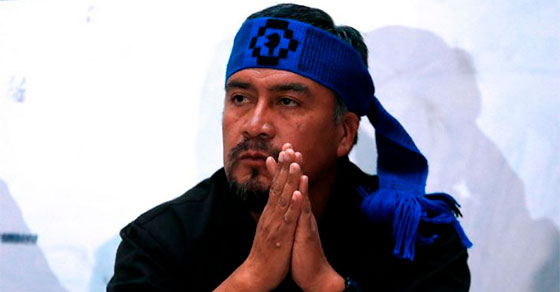According to CORMA, the crime has seen exponential growth over the last 4 years.
A video shows Héctor Llaitul, leader of the Arauco Malleco Coordinator (CAM), asserting that the organization's involvement in wood theft "supports a type of local economy, one that is far more cooperative, far fairer, and benefits the majority of the rural and urban poor as well, beyond just the Mapuche communities that use these resources to promote sovereignty, self-management, and ultimately, revolutionary autonomy."
Llaitul—arrested on Wednesday by the PDI—had previously reignited the debate on wood theft by stating that the proceeds were used to buy "guns" (weapons) and "ammo" (munitions). According to statements provided to Emol Social FACTS by the Chilean Wood Corporation (CORMA), "wood theft is a crime committed by criminal gangs that terrorize and distress local residents while funding other illicit operations in the southern macrozone. Moreover, it has grown exponentially over the last 4 years, both in territorial reach and in the amounts stolen."
As hard crime data, the association reported the following:
- In 2019, 70 southern communes were affected by this crime. By 2022, the number has risen to 106 communes, spanning from the south of the O’Higgins Region to the north of the Los Lagos Region.
- In 2021, the amount stolen nearly quadrupled compared to 2018, reaching $92.5 million USD—equivalent to roughly 50,000 trucks transporting stolen wood across the country.
Meanwhile, the exponential growth of wood theft over 4 years is represented as follows, according to the organization:
• 2018 wood theft: $20.0 million USD
• 2019 wood theft: $45.2 million USD
• 2020 wood theft: $67.8 million USD
• 2021 wood theft: $92.4 million USD. (This corresponded to over 50,000 trucks—140 daily—transporting stolen wood on highways.)
The Perspective of Those Affected
For René Muñoz, manager of Acoforag (Forestry Contractors Association), Llaitul's statements confirm "theft, as it’s unacceptable to use others' property in such a crude manner and claim it benefits communities or that it should be socially acceptable."
• "What he’s proposing is theft," he reiterated. "This is a crime, even if not explicitly defined by law—it’s wood theft. This is funding terrorist activities, so everything we’ve endured for over 20 years converges in this criminal enterprise, which continues to finance their operations."
Finally, he stated, "The State must take responsibility for this issue, working alongside the Legislative Branch to create legal instruments to prosecute this crime with harsher penalties, as currently demanded in the Senate bill."
On the other hand, Michel Esquerre, president of Pymemad (Small and Medium Timber Enterprises Association), asserts that "the Mapuche economy is far more than violence—they work in agriculture, livestock, and more. It is not sustained by wood theft; he cannot claim that."
• "This 'economy' is a confusion born from violence. It’s almost a war of poverty; it’s the destruction of the economy. The violent fringe does not represent Indigenous peoples—it represents only the violent few, who aren’t even the full group," he remarked.
"From the perspective of businesses and SMEs, wood theft is unfair competition because we pay taxes and follow the correct procedures—from formal contracts to paying dues. It’s unjust to compete with an informal industry that bypasses the entire process for its own gain," concluded Esquerre, noting that these crimes had spiraled out of control in recent months.
Necessary Measures
Rodrigo Arellano, Vice Dean of the Government Faculty at Universidad del Desarrollo, says that "as long as we see a weak government in enforcing security, or a Judiciary that fails to deliver justice, or a timid Legislative Branch in enacting laws, these groups will continue to thrive on the State’s inefficiency."
"This problem is out of control. Their measures succeed because no one is overseeing them—it grows daily. Unless the State tackles the root of this issue, these terrorist groups will persist," Arellano argued, concluding that the only measure the Government can take now is to confront these groups head-on, as they engage in unchecked violence—a fact not being treated with the seriousness it deserves, but rather viewed through a political rather than urgent lens."
Source:guioteca.com







Comments (0)
No comments yet. Be the first to comment!
Leave a comment